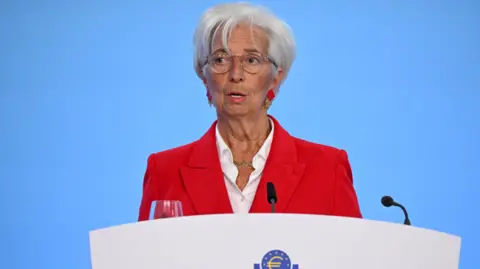In an impactful decision, the European Central Bank (ECB) has announced a reduction in its key interest rate, marking the eighth time this year it has cut the rate, which now stands at 2.0%. This move comes as a direct response to the ongoing economic pressures exerted by tariffs implemented by former President Donald Trump. These tariffs have raised significant concerns within the eurozone, affecting business investment and trade dynamics. Despite having seen a slight easing in inflation across its member states, the collective economic performance remains sluggish, prompting the ECB to take such measures.
Initially set at 2.25%, the reduction of the interest rate aims to stimulate economic activity within the eurozone. The circumstances surrounding the European economy have been precarious even before Trump’s imposition of harsh tariffs. The ECB’s recent analysis highlights that uncertainty stemming from these trade policies will likely hinder business investments and dampen exports, which are critical components of economic health.
The ECB’s projections indicate that while the eurozone recorded a stronger-than-expected growth of 0.3% in the first quarter of the year, this momentum may weaken as the year progresses. The tariffs on EU steel and aluminum, which Trump recently doubled from 25% to 50%, are a major catalyst for this anticipated slowdown. Although the imposition of additional tariffs on other European goods has been postponed until July 9 to allow for negotiations, tensions persist with at least a 10% tariff remaining active in the meantime. In retaliation, the EU has meticulously crafted a list of tariffs anticipated to target approximately €21 billion worth of American products.
Looking ahead, the ECB is cautiously optimistic. They project that the economy will begin to regain strength in the medium-term, particularly spurred by increased European spending in defense and infrastructure. NATO has been vocally encouraging its member countries to enhance their defense expenditures in light of ongoing geopolitical threats, particularly from Russia’s actions in Ukraine. Furthermore, recent statistics indicate that inflation within the 20-member eurozone dropped below the ECB’s target rate of 2%, settling at 1.9% in April, a factor that the central bank views positively as it anticipates stability between 2025 and 2027.
ECB President Christine Lagarde commented on the economic outlook, noting that rising incomes and a strong job market will empower households to increase their spending, creating increased resilience against global economic shocks. However, she acknowledged substantial uncertainty, mainly attributed to the trade-related tensions with the United States.
In a diplomatic move, German Chancellor Friedrich Merz was scheduled to meet Trump in the White House for discussions focused on tariffs and defense spending. This meeting could potentially shape the future of transatlantic economic relations, depending on the outcomes.
Trump’s reaction to the pace of the ECB’s interest rate cuts has been mixed; he has expressed approval of these measures while simultaneously criticizing the U.S. Federal Reserve and its chair, Jerome Powell. In recent reports from payroll firm ADP, data reflected a worrying decline in U.S. job growth during May, the lowest observed in over two years, suggesting broader economic issues. Trump took to social media to emphasize the urgency of rate cuts by the Federal Reserve, stating that too much time has elapsed without necessary adjustments in light of the ECB’s proactive strategies.
As markets await further developments, official employment statistics out of the U.S. are anticipated shortly, with projections indicating modest job growth and stable unemployment rates. As the eurozone responds to its economic challenges and trade uncertainties with strategic decisions, both the ECB and the broader international community closely monitor the evolving economic landscape shaped by these ongoing financial dynamics.



